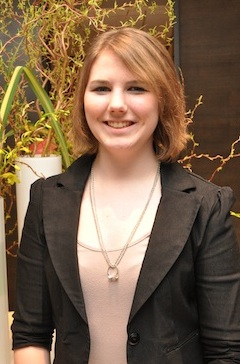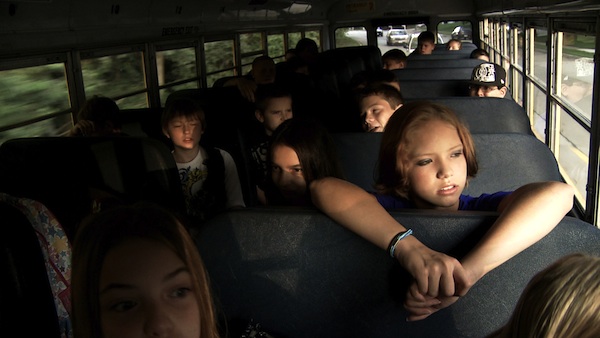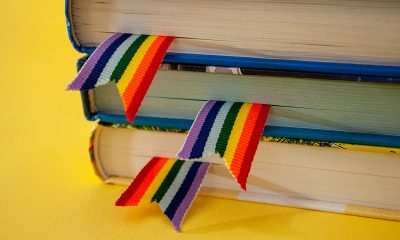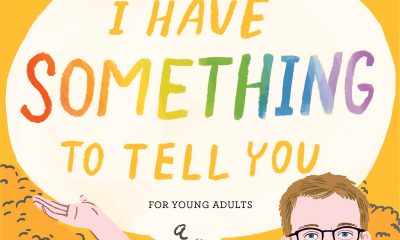Arts & Entertainment
Showdown over an ‘R’ rating
New documentary on bullying leads lesbian teen on a mission

Katy Butler, 17, launched a Change.org petition to change the rating for the upcoming documentary “Bully” and was in D.C. last week to bring attention to her cause.
“When I saw this new movie was coming out, I thought it was so awesome, because it was about bullying and had such a great message, and then I saw that it was rated ‘R’ … it’s missing the entire target audience of the film, which is the middle and high school students,” Butler says about why she started the petition.
Filmed over the 2009-10 school year, “Bully,” directed by Lee Hirsch, follows three students who have been bullied, including one who brought a gun to school and is now in juvenile detention awaiting the outcome of her case, and two sets of parents whose sons committed suicide after being bullied.
The film’s website, thebullyproject.com, states that more than 13 million American kids will be bullied this year and three million students are absent each month because they do not feel safe in school. A disproportionate number of them are LGBT.
According to filmratings.com, a website the Motion Picture Association of America links to, “Bully” received an ‘R’ rating for “some language.” The word “fuck” is used multiple times in the film.
According to the MPAA’s classification and rating rules effective, Jan. 1, 2010, “a motion picture’s single use of one of the harsher sexually derived words … initially requires at least a PG-13 rating. More than one such expletive requires an R rating, as must even one of those words used in a sexual context.”
One of the complaints about the rating is the difficulty pre-teens and most teenagers will have in seeing the film. While an R rating does not keep them from seeing the movie altogether, it does restrict when they can see it, since they will need a parent with them.
It is also more difficult to get schools to show R-rated films, as it requires permission slips to be signed in many school districts.
“The R rating is not a judgment on the value of any movie. The rating simply conveys to parents that a film has elements strong enough to require careful consideration before allowing their children to view it,” Joan Graves, chairman of the classification and rating administration, said in a statement released after receiving the petition.
Butler, who came out as a lesbian in middle school, has been the victim of bullying herself.
“My school didn’t really like that, they called me names … pushed me into lockers and into walls, they ended up slamming my hand into my locker and breaking my finger,” Butler says.
Some have asked why the filmmakers don’t just remove the scenes with the expletives, or censor just the word, since many say if the word was used more sparingly, the film would have received a PG-13 rating, but Butler doesn’t think that would help matters.
“They can’t take out the word, it won’t have the same message. It won’t have the same effect on the kids, parents and teachers who see this movie,” Butler says. “Those are the words that kids used everyday in school to bully each other … no one goes into schools and takes out those words.”
The MPAA also hosted a screening with D.C.-area principals and educators on March 15. The screening was followed by a panel discussion on the challenges educators face in dealing with bullying and how to best ensure that students feel safe when they are in school.
MPAA Chairman Chris Dodd (a former U.S. senator), “Bully” distributor Harvey Weinstein, “Bully” director Lee Hirsch, D.C. Public Schools Chancellor Kaya Henderson and Joseph Wright, senior vice president and head of the Child Health Advocacy Institute at Children’s National Medical Center in Washington, were on the panel.
As of Tuesday afternoon, Butler’s petition had garnered about 439,000 signatures.
Graves’s statement said that the MPAA shares Butler’s goal of highlighting the problems with bullying.
“Katy Butler’s efforts in bringing the issue of bullying to the forefront of a national discussion in the context of this new film are commendable and we welcome the feedback about this movie’s rating,” Graves said in the statement. “We hope that her efforts will fuel more discussion among educators, parents and children.”
Butler has met with the head of the ratings board, when she hand delivered the signed petitions.

Katy Butler was in Washington last week to encourage the MPAA to reconsider its R rating for the new documentary ‘Bully.’ (Blade photo by Michael Key)
Butler’s efforts to change the rating have been noticed by many, including Ellen DeGeneres, who had Butler on her talk show and has asked her viewers to follow her lead and sign the petition.
“Ellen is wonderful, she is one of my roles models,” Butler says of the comedian. “I definitely couldn’t be doing what I’m doing right now without her.”
DeGeneres is not the only celebrity to push for the MPAA to change the rating. New Orleans Saints quarterback Drew Brees has Tweeted for his followers to sign the petition. A bipartisan group of 26 members of Congress has thrown its support behind the petition.
Younger celebrities, such as Justin Beiber and Demi Lovato, have also been pushing for people to sign the petition, Tweeting about it to their many followers.
“I think [Bieber and Lovato] especially are hitting the preteen, middle school age group because those are their fans,” Butler says. “If your role model is supporting something as important as bullying, then a lot of the time, these kids are going to look at it too.”
Butler will receive a special award, presented by Harvey Weinstein, whose production company is releasing the film, at GLAAD’s 23rd annual Media Awards in New York City on Saturday.
“The MPAA made a mistake in restricting this film to adult audiences. Everyone — young and old alike — needs to see this film and the devastating impact that bullying can have on today’s young people,” says GLAAD spokesperson Herndon Graddick. “Katy has bravely used her voice to take a stand and has inspired countless Americans, including so many members of Congress and public figures, to show their support for the safety of all our children.”
All the advocacy toward changing “Bully’s” rating is just the beginning for this high school junior. Butler plans on studying political activism once she finishes high school. She would like to attend the University of Michigan or a school in the D.C., New York or Chicago areas.
“Bully” opens in theaters in New York and Los Angeles on March 30 and D.C. and other cities on April 13.
Books
Love or fear flying you’ll devour ‘Why Fly’
New book chronicles a lifetime obsession with aircraft

‘Why Fly’
By Caroline Paul
c. 2026, Bloomsbury
$27.99/256 pages
Tray table folded up.
Check. Your seat is in the upright position, the airflow above your head is just the way you like it, and you’re ready to go. The flight crew is making final preparations. The lights are off and the plane is backing up. All you need now is “Why Fly” by Caroline Paul, and buckle up.

When she was very young, Paul was “obsessed” with tales of adventure, devouring accounts written by men of their derring-do. The only female adventure-seeker she knew about then was Amelia Earhart; later, she learned of other adventuresome women, including aviatrix Bessie Coleman, and Paul was transfixed.
Time passed; Paul grew up to create a life of adventure all her own.
Then, the year her marriage started to fracture, she switched her obsession from general exploits to flight.
Specifically, Paul loves experimental aircraft, some of which, like her “trike,” can be made from a kit at home. Others, like Woodstock, her beloved yellow gyrocopter, are major purchases that operate under different FAA rules. All flying has rules, she says, even if it seems like it should be as freewheeling as the birds it mimics.
She loves the pre-flight checklist, which is pure anticipation as well as a series of safety measures; if only a relationship had the same ritual. Paul loves her hangar, as a place of comfort and for flight in all senses of the word. She enjoys thinking about historic tales of flying, going back before the Wright Brothers, and including a man who went aloft on a lawn chair via helium-filled weather balloons.
The mere idea that she can fly any time is like a gift to Paul.
She knows a lot of people are terrified of flying, but it’s near totally safe: generally, there’s a one in almost 14 million chance of perishing in a commercial airline disaster – although, to Paul’s embarrassment and her dismay, it’s possible that both the smallest planes and the grandest loves might crash.
If you’re a fan of flying, you know what to do here. If you fear it, pry your fingernails off the armrests, take a deep breath, and head to the shelves. “Why Fly” might help you change your mind.
It’s not just that author Caroline Paul enjoys being airborne, and she tells you. It’s not that she’s honest in her explanations of being in love and being aloft. It’s the meditative aura you’ll get as you’re reading this book that makes it so appealing, despite the sometimes technical information that may flummox you between the Zen-ness. It’s not overwhelming; it mixes well with the history Paul includes, biographies, the science, heartbreak, and exciting tales of adventure and risk, but it’s there. Readers and romantics who love the outdoors, can’t resist a good mountain, and crave activity won’t mind it, though, not at all.
If you own a plane – or want to – you’ll want this book, too. It’s a great waiting-at-the-airport tale, or a tuck-in-your-suitcase-for-later read. Find “Why Fly” and you’ll see that it’s an upright kind of book.
The Blade may receive commissions from qualifying purchases made via this post.
Theater
Out actor Kevin Cahoon on starring role in ‘Chez Joey’
Arena production adapted from Broadway classic ‘Pal Joey’

‘Chez Joey’
Through March 15
Arena Stage
1101 Sixth St., S.W.
Tickets start at $93
Arenastage.org
As Melvin Snyder in the new musical “Chez Joey,” out actor Kevin Cahoon plays a showbiz society columnist who goes by the name Mrs. Knickerbocker. He functions as a sort of liaison between café society and Chicago’s Black jazz scene circa 1940s. It’s a fun part replete with varied insights, music, and dance.
“Chez Joey” is adapted from the Broadway classic “Pal Joey” by Richard Rodgers and Lorenz Hart. It’s inspired by John O’Hara’s stories based on the exploits of a small-time nightclub singer published in The New Yorker.
A warm and humorous man, Cahoon loves his work. At just six, he began his career as a rodeo clown in Houston. He won the Star Search teen division at 13 singing songs like “Some People” from “Gypsy.” He studied theater at New York University and soon after graduating set to work playing sidekicks and comedic roles.
Over the years, Cahoon has played numerous queer parts in stage productions including “Hedwig and the Angry Inch,” “La Cage aux Folles,” “Rocky Horror” as well as Peanut in “Shucked,” and George the keyboardist in “The Wedding Singer,” “a sort of unicorn of its time,” says Cahoon.
Co-directed by Tony Goldwyn and the great Savion Glover, “Chez Joey” is a terrific and fun show filled with loads of talent. Its relevant new book is by Richard Lagravenese.
On a recent Monday off from work, Cahoon shared some thoughts on past and current happenings.
WASHINGTON BLADE: Is there a through line from Kevin, the six-year-old rodeo clown, to who we see now at Arena Stage?
KEVIN CAHOON: Anytime I want to land a joke in a theater piece it goes back to that rodeo clown. It doesn’t matter if it’s Arena’s intimate Kreeger Theatre or the big rodeo at the huge Houston Astrodome.
I was in the middle stadium and there was an announcer — a scene partner really. And we were doing a back and forth in hopes of getting laughs. At that young age I was trying to understand what it takes to get laughs. It’s all about timing. Every line.
BLADE: Originally, your part in “Chez Joey” Melvin was Melba who sings “Zip,” a clever woman reporter’s song. It was sort of a star feature, where they could just pop in a star in the run of “Pal Joey.”
CAHOON: That’s right. And in former versions it was played by Martha Plimpton and before her Elaine Stritch. For “Chez Joey,” we switched gender and storyline.
We attempted to do “Zip” up until two days before we had an audience at Arena. Unexpectedly they cut “Zip” and replaced it with a fun number called “I Like to Recognize the Tune,” a song more connected to the story.
BLADE: Wow. You must be a quick study.
CAHOON: Well, we’re working with a great band.
BLADE: You’ve played a lot of queer parts. Any thoughts on queer representation?
CAHOON: Oh yes, definitely. And I’ve been very lucky that I’ve had the chance to portray these characters and introduce them to the rest of the world. I feel honored.
After originating Edna, the hyena on Broadway in “The Lion King,” I left that to do “Hedwig and the Angry Inch” as standby for John Cameron Mitchell, doing one show a week for him.
Everyone thought I was crazy to leave the biggest musical of our time with a personal contract and getting paid more money that I’d ever made to get $400 a week at the downtown Jane Street Theatre in a dicey neighborhood.
At the time, I really felt like I was with cool kids. I guess I was. And I never regretted it.
BLADE: When you play new parts, do you create new backstories for the role?
CAHOON: Every single time! For Melvin, I suggested a line about chorus boys on Lakeshore Drive.
BLADE: What’s up next for Kevin Cahoon?
CAHOON: I’m about to do the New York Theatre Workshop Gala; I’ve been doing it for nine years in a row. It’s a huge job. I’ll also be producing the “Cats: The Jellicle Ball” opening on Broadway this spring; it’s a queer-centric uptown vogue ball with gay actor André de Shields reprising his role as “Old Deuteronomy.”
BLADE: There’s a huge amount of talent onstage in “Chez Joey.”
CAHOON: There is. I’m sharing a dressing room with Myles Frost who plays Joey. He won accolades for playing Michael Jackson on Broadway. We’ve become great friends. He’s a miracle to watch on stage. And Awa [Sal Secka], a D.C. local, is great. Every night the audience falls head over heels for her. When this show goes to New York, Awa will, no doubt, be a giant star.
BLADE: Do you think “Chez Joey” might be Broadway bound?
CAHOON: I have a good feeling it is. I’ve done shows out of town that have high hopes and pedigree, but don’t necessarily make it. “Chez Joey” is a small production, it’s funny, and audiences seem to love it.

The Capital Pride Alliance held the annual Pride Reveal event at The Schuyler at The Hamilton Hotel on Thursday, Feb. 26. The theme for this year’s Capital Pride was announced as: “Exist. Resist. Have the audacity!”
(Washington Blade photos by Michael Key)























-

 Federal Government4 days ago
Federal Government4 days agoTwo very different views of the State of the Union
-

 Virginia5 days ago
Virginia5 days agoVa. activists preparing campaign in support of repealing marriage amendment
-

 Opinions4 days ago
Opinions4 days agoThe global cost of Trump’s foreign aid ideology
-

 Movies3 days ago
Movies3 days agoMoving doc ‘Come See Me’ is more than Oscar worthy





















